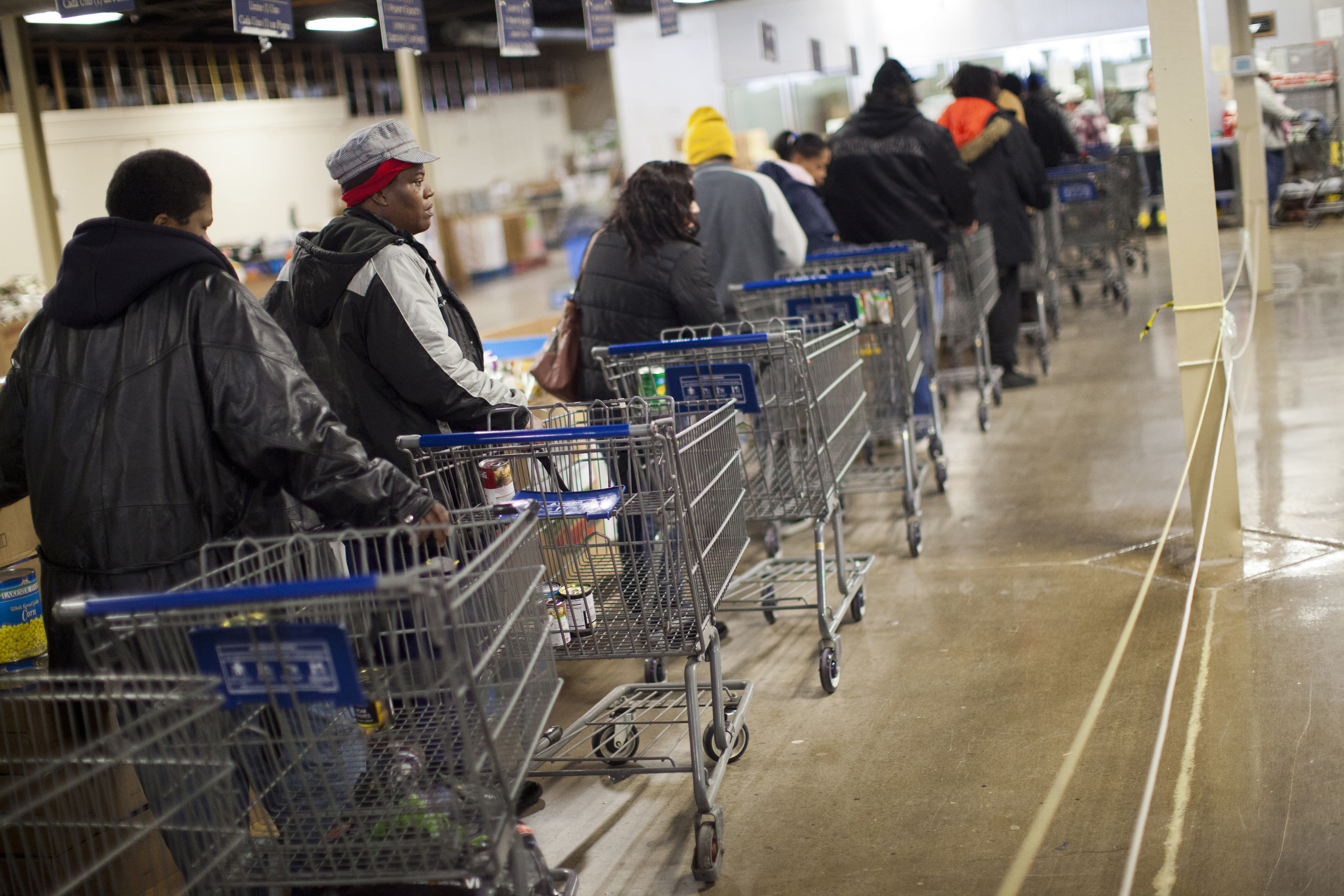How Republicans will wage war on the poor
Medicaid and food stamps are on the chopping block in a Trump administration


For years now, Speaker of the House Paul Ryan has been talking in his earnest Wisconsin way about how much he cares about poverty. Republicans care about the poor, he insists, they just don't want to trap them in dependency — thus his proposals for a panopticon surveillance bureaucracy to coerce poor people into getting jobs and following bourgeois moral values.
But now that Donald Trump will become president with a Republican-controlled Congress, we're getting a vision of what that's actually going to look like in practice. It will be an all-out war on poor people's programs, without even a whisper of countervailing effort to help them get jobs or anything else.
First and probably most importantly, Republicans want to drastically roll back Medicaid. The first item on the agenda is repealing ObamaCare, which contains a large expansion of that program. If repealed in full, that would throw roughly 16 million people off the program at a stroke.
The Week
Escape your echo chamber. Get the facts behind the news, plus analysis from multiple perspectives.

Sign up for The Week's Free Newsletters
From our morning news briefing to a weekly Good News Newsletter, get the best of The Week delivered directly to your inbox.
From our morning news briefing to a weekly Good News Newsletter, get the best of The Week delivered directly to your inbox.
Second, they want to repeat the basic program of welfare reform on Medicaid. Welfare reform had three main prongs: block-granting the money to the states, capping spending so its size is eaten away by inflation every year, and sharp new restrictions on eligibility. This was justified in 1996 by a firestorm of vicious race-baiting about dependency, but its objective was obvious: to slowly obliterate the program. This goal has been mostly achieved. Enrollment in welfare has consistently fallen even during the Great Recession, and the block grant allows conservative states to bogart the money for things like anti-abortion agitprop. Overall, extreme poverty has increased by 150 percent as a direct result of this policy.
Now, Medicaid is already a (rather unwieldy) federal-state partnership, with substantial flexibility for defining benefits and eligibility — which, for conservative states, means "be as stingy as possible." Republicans, led by Trump's choice for secretary of health and human services, Tom Price, want to make it much easier for those states to kick people off the program, and slowly ratchet down spending just as happened with welfare reform. As Gene Sperling summarizes:
Mr. Price's own proposal, which he presented as the chairman of the House budget committee, would cut Medicaid by about $1 trillion over the next decade. This is on top of the reduction that would result from the repeal of the Affordable Care Act, which both Mr. Trump and Republican leaders have championed. Together, full repeal and block granting would cut Medicaid and the Children's Health Insurance Program funding by about $2.1 trillion over the next 10 years — a 40 percent cut. [New York Times]
That's another roughly 14-21 million people kicked off Medicaid after 10 years — call it 30-35 million in total.
Second, Republicans are eyeing food stamps for more cuts. They already cut the program by $9 billion in 2014, and earlier this year mulled an additional $150 billion over 10 years — or a cut of 20 percent. This policy preference is reflected in conservative media, which is constantly fulminating against food stamps. A Fox News segment on Tuesday, for instance, railed against a supposed epidemic of fraud totaling $70 million, suggesting that therefore the program maybe should be abolished.
A free daily email with the biggest news stories of the day – and the best features from TheWeek.com
As Kevin Drum points out, not only did they not mention $70 million is less than 0.1 percent of the total food stamp spending (and a vanishingly minuscule fraction of the featherbedding that happens in the Defense Department), their fraud number is probably bogus anyway. And most of what is counted as "fraud" are innocent mistakes caused by difficulty navigating the program's complicated eligibility schedule — less than 1 percent of food stamp benefits go to households that are actually ineligible.
Taken together, the actual policy agenda here is reasonably clear. Republicans think rich people have too little income, and poor people too much. They will thus cut programs serving the bottom of the income ladder to make budget headroom for immense tax cuts for the rich. Paul Ryan will go on Meet the Press and smile and calmly buffalo the dim DC political reporters with a lot of wonky-sounding nonsense. But the upshot of this agenda is a great increase in desperation in America — more hungry people, more uninsured people, and more people dying of preventable illness.
Ryan Cooper is a national correspondent at TheWeek.com. His work has appeared in the Washington Monthly, The New Republic, and the Washington Post.
-
 The Mint’s 250th anniversary coins face a whitewashing controversy
The Mint’s 250th anniversary coins face a whitewashing controversyThe Explainer The designs omitted several notable moments for civil rights and women’s rights
-
 ‘If regulators nix the rail merger, supply chain inefficiency will persist’
‘If regulators nix the rail merger, supply chain inefficiency will persist’Instant Opinion Opinion, comment and editorials of the day
-
 Trump HHS slashes advised child vaccinations
Trump HHS slashes advised child vaccinationsSpeed Read In a widely condemned move, the CDC will now recommend that children get vaccinated against 11 communicable diseases, not 17
-
 Bari Weiss’ ‘60 Minutes’ scandal is about more than one report
Bari Weiss’ ‘60 Minutes’ scandal is about more than one reportIN THE SPOTLIGHT By blocking an approved segment on a controversial prison holding US deportees in El Salvador, the editor-in-chief of CBS News has become the main story
-
 Has Zohran Mamdani shown the Democrats how to win again?
Has Zohran Mamdani shown the Democrats how to win again?Today’s Big Question New York City mayoral election touted as victory for left-wing populists but moderate centrist wins elsewhere present more complex path for Democratic Party
-
 Millions turn out for anti-Trump ‘No Kings’ rallies
Millions turn out for anti-Trump ‘No Kings’ ralliesSpeed Read An estimated 7 million people participated, 2 million more than at the first ‘No Kings’ protest in June
-
 Ghislaine Maxwell: angling for a Trump pardon
Ghislaine Maxwell: angling for a Trump pardonTalking Point Convicted sex trafficker's testimony could shed new light on president's links to Jeffrey Epstein
-
 The last words and final moments of 40 presidents
The last words and final moments of 40 presidentsThe Explainer Some are eloquent quotes worthy of the holders of the highest office in the nation, and others... aren't
-
 The JFK files: the truth at last?
The JFK files: the truth at last?In The Spotlight More than 64,000 previously classified documents relating the 1963 assassination of John F. Kennedy have been released by the Trump administration
-
 'Seriously, not literally': how should the world take Donald Trump?
'Seriously, not literally': how should the world take Donald Trump?Today's big question White House rhetoric and reality look likely to become increasingly blurred
-
 Will Trump's 'madman' strategy pay off?
Will Trump's 'madman' strategy pay off?Today's Big Question Incoming US president likes to seem unpredictable but, this time round, world leaders could be wise to his playbook
